Sigma applies a set of 7 habits and 5 essential fundamentals in all projects
25/07/2023
In the modern era, we always face challenges: fear and inferiority; desperate thoughts, deadlock; heavy responsibilities; desire and ambition to possess; imbalance in life; selfish; conflict and differences with others; desire to be heard… And many people can write dozens of pages of paper about the difficulties and challenges they face every day.
So, what are the solutions to these challenges?
So, what are the solutions to these challenges?
Let's embrace change and let the seven habits of successful people become our own. When we do, we not only face every challenge in a positive way, but we also become a different person: a successful person, effective in personal and relationships around.
Seven Habits of Highly Effective People – Things in the book of the same name by Stephen R. Covey (1932-2012), an American educator, entrepreneur, author, and speaker. He is the author of many of the world's top books on leadership and personal development.
Sigma has been applying a set of 7 habits and 5 essential fundamentals in all projects, to enhance performance and help everyone manage his or her time effectively. At the same time, each Sigma person can then build good relationships, think positively and creatively to approach work with a more correct spirit.
Seven Habits of Highly Effective People – Things in the book of the same name by Stephen R. Covey (1932-2012), an American educator, entrepreneur, author, and speaker. He is the author of many of the world's top books on leadership and personal development.
Sigma has been applying a set of 7 habits and 5 essential fundamentals in all projects, to enhance performance and help everyone manage his or her time effectively. At the same time, each Sigma person can then build good relationships, think positively and creatively to approach work with a more correct spirit.
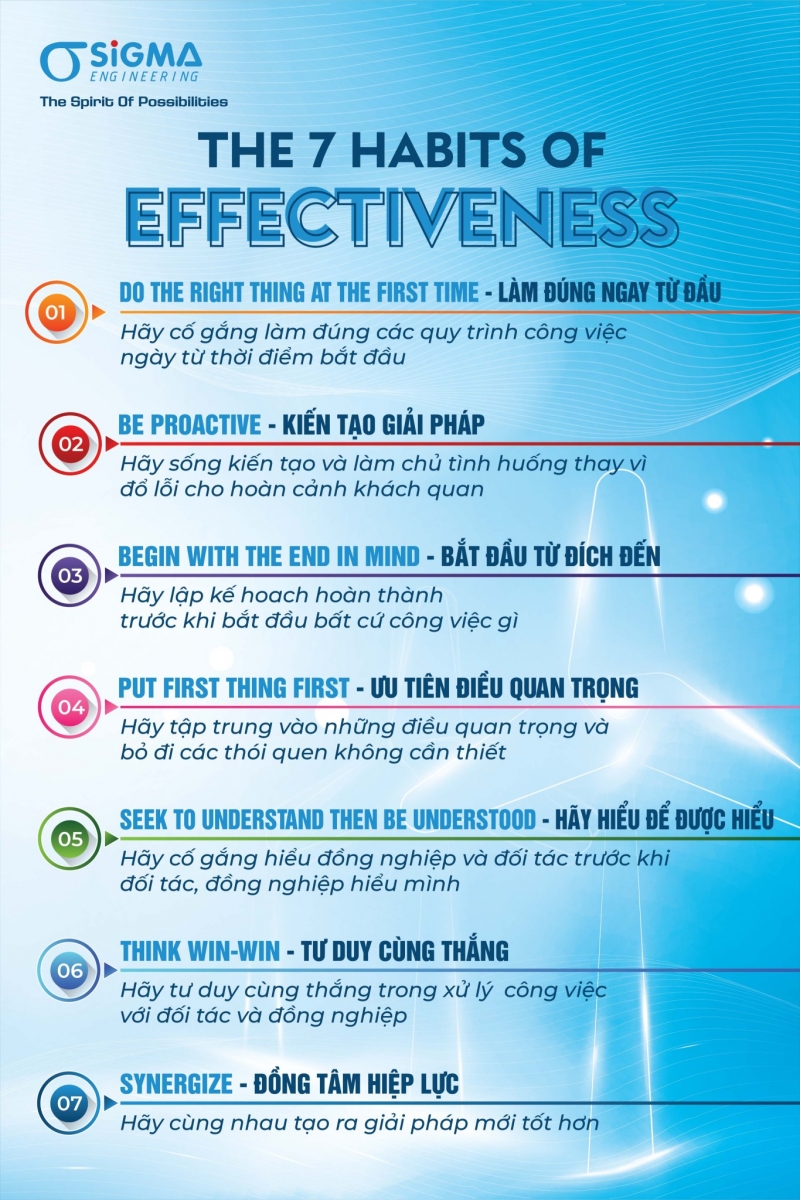
Habits
Habits are consistent patterns, sometimes unconsciously, that express our regular personality. They determine the effectiveness of our activities and create our inner strength. It can be said that habits are one of the important factors that determine the fate of each person.
Habits, especially bad ones, are very attractive and very difficult to change or give up. If we understand the nature of habits and have a high determination, we can give up bad habits and learn good habits.
To build a habit we need to have all 3 elements:

And the seven habits are not a discrete collection, but rather a coherent combination of a continuous, progressive approach that enhances personal effectiveness and that individual's relationships.
The first habit
Do the right thing at the first time
“Do the right thing at the first time” is a management motto associated with the efficient use of resources (in the definition, “just-in-time”), to limit errors in the production processes - management to save resources used to repair and overcome those “failures”.
For the field of installation and construction of M&E Systems like Sigma, this is extremely important, because Quality creates a brand. “Do it right from the beginning” means not accepting “just do it, fix it somewhere wrong”, plan fast and execute slowly. Doing it right from the beginning is from the planning stage, strictly controlling the quality of input materials to the construction, installation, and handover process. The quality of each stage is always guaranteed according to the requirements of the company. Thanks to good control, Sigma's projects when reaching customers are products of outstanding quality.
The second habit
Be proactive
The second habit is the practice of maintaining, developing, and increasing our own wealth. We must always practice and innovate in the following four aspects:
The first habit
Do the right thing at the first time
“Do the right thing at the first time” is a management motto associated with the efficient use of resources (in the definition, “just-in-time”), to limit errors in the production processes - management to save resources used to repair and overcome those “failures”.
For the field of installation and construction of M&E Systems like Sigma, this is extremely important, because Quality creates a brand. “Do it right from the beginning” means not accepting “just do it, fix it somewhere wrong”, plan fast and execute slowly. Doing it right from the beginning is from the planning stage, strictly controlling the quality of input materials to the construction, installation, and handover process. The quality of each stage is always guaranteed according to the requirements of the company. Thanks to good control, Sigma's projects when reaching customers are products of outstanding quality.
The second habit
Be proactive
The second habit is the practice of maintaining, developing, and increasing our own wealth. We must always practice and innovate in the following four aspects:

Innovation and practice are a principle and a process that helps us to grow and move along the spiral of growth and continuous innovation.
This path of growth requires us to learn, commit and do it every day to a higher and higher level. No level is high enough to stop.
Each Sigma member needs to continuously develop, continuously learn - commit - perform, continuously perform - learn - commit and continuously commit – perform - learn... Alternately and continuously follow the spiral of growth.
The third habit
Begin with the end in mind
Let's think deeply about what our goal is. Many people have lived and achieved "ephemeral" achievements and at the end of their lives realize they have not achieved a proper goal.
Each of us can have one focus or a combination of different focuses for our lives: family, money, work, possessions, pleasures, friends, rivals, religion, self, couple…
Successful people create for themselves a coordinated focus so that they can achieve the four factors: Safety, Direction, Wisdom, and Competence at their peak. As a result, successful people are always proactive and harmoniously combine all aspects of life.
To get into the habit of “begin with the end in mind,” we must establish a personal mission statement. This statement is based on values and principles and clearly shows who we want to be (character) and what we will do (dedication, achievement).
We must not only manage our lives – do the right thing – but also lead our lives – do the right thing – to stay on track towards the defined destination.
The Fourth Habit
Put first thing first

We manage time in terms of a four-part matrix:
The first part: (left, top) includes urgent and important activities.
The second part: (right, top) includes non-urgent but important activities.
The third part:(left, bottom) includes urgent but not important activities.
The fourth part: (right, bottom) includes activities that are neither urgent nor important.
The Fifth Habit
Seek to understand then be understood
Humans have a habit of imposing their subjective thoughts on the circumstances of others. A metaphor for this imposition is as follows: an eye doctor suggests that patients who cannot see clearly use the glasses he is using, because he thinks that if he sees well, they will also see clearly!
To avoid this tendency to impose or give hasty advice, we need to listen and understand others.
To practice effective communication habits, you should not only rely on communication techniques, but build yourself an attitude of listening and understanding that leads to openness and trust. We also need to open emotional accounts to create understanding between two souls.
The Sixth Habit
Think win-win
Ineffective people spend 90% of the time on the first part (Important and Urgent) and 10% on the fourth part (Not Important and Not Urgent).
Others spend time on the third part (Urgent, Not Important) but always think they are in the first part.
Successful people spend very little time on the third and fourth parts. They will also minimize the time spent on the first part to focus their precious time on the second part (Non-Urgent – Important). This section includes tasks such as: building relationships, writing personal mission statements, making long-term plans… – they are important, necessary but rarely done because they are not urgent.
To be able to focus on this second box and say “No” to all sorts of unimportant things, successful people must always rely on established principles, personal mission, roles, and goals.
The tool used to create the second quadrant activities should meet the following six important criteria:
The first part: (left, top) includes urgent and important activities.
The second part: (right, top) includes non-urgent but important activities.
The third part:(left, bottom) includes urgent but not important activities.
The fourth part: (right, bottom) includes activities that are neither urgent nor important.
The Fifth Habit
Seek to understand then be understood
Humans have a habit of imposing their subjective thoughts on the circumstances of others. A metaphor for this imposition is as follows: an eye doctor suggests that patients who cannot see clearly use the glasses he is using, because he thinks that if he sees well, they will also see clearly!
To avoid this tendency to impose or give hasty advice, we need to listen and understand others.
To practice effective communication habits, you should not only rely on communication techniques, but build yourself an attitude of listening and understanding that leads to openness and trust. We also need to open emotional accounts to create understanding between two souls.
The Sixth Habit
Think win-win
Ineffective people spend 90% of the time on the first part (Important and Urgent) and 10% on the fourth part (Not Important and Not Urgent).
Others spend time on the third part (Urgent, Not Important) but always think they are in the first part.
Successful people spend very little time on the third and fourth parts. They will also minimize the time spent on the first part to focus their precious time on the second part (Non-Urgent – Important). This section includes tasks such as: building relationships, writing personal mission statements, making long-term plans… – they are important, necessary but rarely done because they are not urgent.
To be able to focus on this second box and say “No” to all sorts of unimportant things, successful people must always rely on established principles, personal mission, roles, and goals.
The tool used to create the second quadrant activities should meet the following six important criteria:
- Coherence: there must be harmony, unity and connection between vision and mission, between roles and goals, between priorities and plans, between will and discipline;
- Balance: balance life and do not ignore an important factor such as health, family, career preparation or personal development;
- It is recommended to use the basic unit of time which is the week
- Pay attention to the human aspect;
- Flexibility: tools must serve people, not the other way around, and tools must reflect our styles, needs, and ways;
- Compactness: easy to carry and easy to use.
To become an effective second umbrella self-manager, we need to define and identify all our roles such as father, husband, son, business director, friend... and have its own key goals for each role to pursue and execute.
The six modes of interaction include:
The six modes of interaction include:
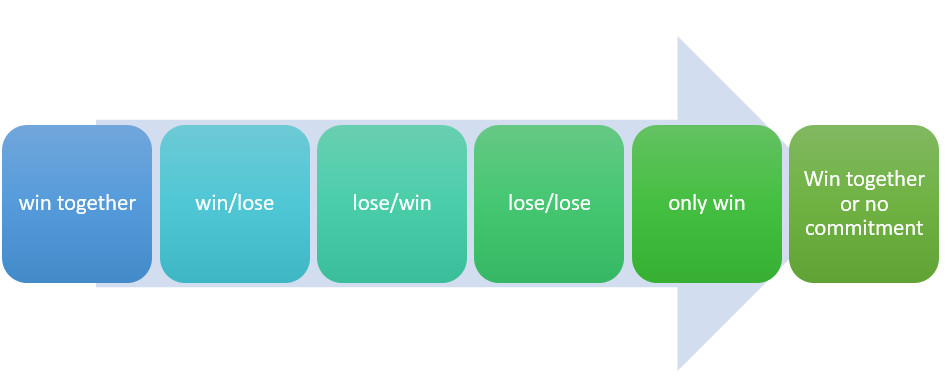
In real life, most situations have an interdependence relationship, so win-win thinking is the most appropriate solution.
The principle of win-win is the fundamental principle of success in all human interactions. It consists of five aspects of interdependence, starting with personality, then relationships to form agreements.
It must be nurtured in a structured and disciplined environment built on win-win thinking. The principle of win-win cannot be achieved by people with a win/lose, lose/win or lose/lose mindset.
The Seventh Habit
Work together
The synergy is always stronger than the parts put together. Cooperation and synergy are essential requirements of the principle-centered leadership model. It is a catalyst that helps to unite and unleash the great power within each of us.
Teamwork always brings better results. It is the full result of many other habits. It brings success in an interdependent reality – teamwork, team building, developing solidarity and creativity with others.
Cooperation does not mean homogenizing everyone. In contrast, cooperation values the differences of each of us in intellectual, emotional, psychological, viewpoint and way of seeing problems.
Besides, Sigma also mentions 5 essential fundamentals for each Sigma member to aim for and follow, thereby, improving the quality and of each member:
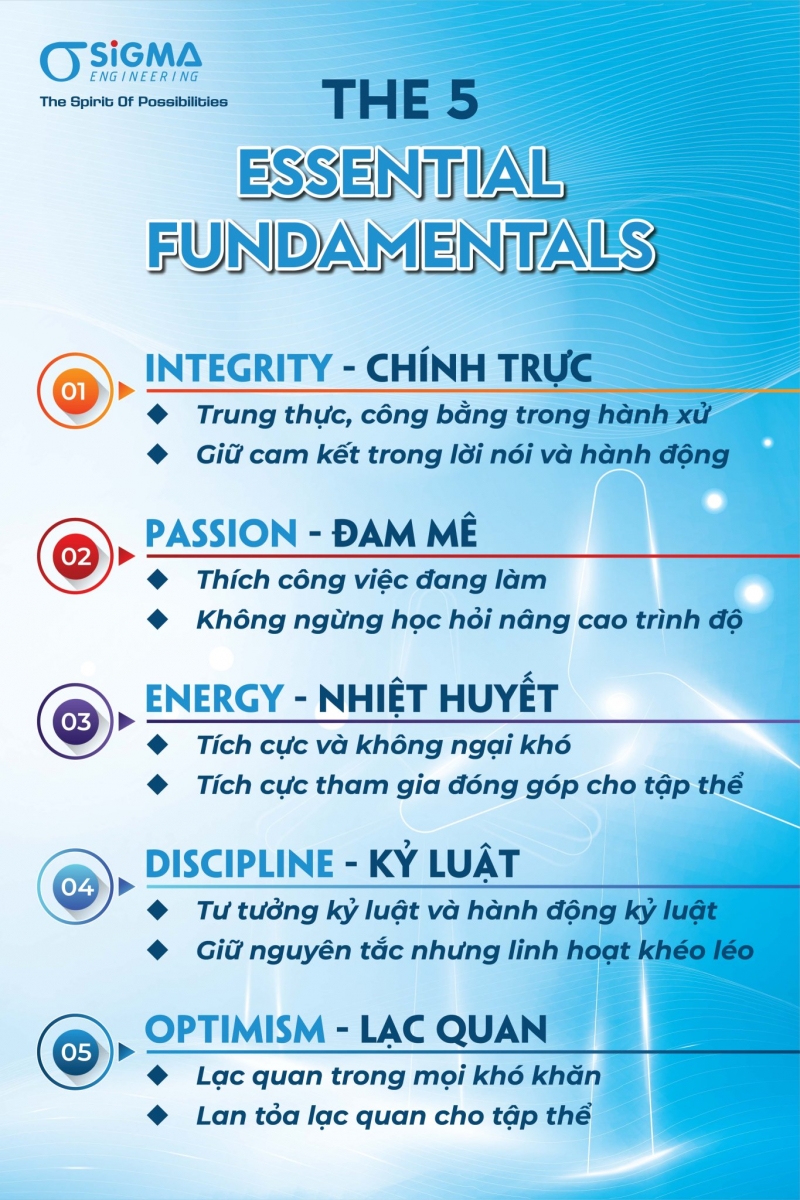
1. Integrity
Integrity is being honest and demonstrating consistent and uncompromising adherence to strong moral and ethical principles and values. In ethics, integrity is considered as honesty and correctness in one's actions.
2. Passion
Passion in life is extremely important to everyone. It helps people find and understand themselves, only when we see what we hate or like, have or don't have... can we understand what we need. like what to pursue. Simply put, when a person has passion, they will have a life goal, a life purpose from which to strive to persevere and succeed.
3. Energy
Enthusiasm can be understood as when you put 100% of your energy and attention into what you pursue. Enthusiasm can be shown in the way you perform your work with passion and excitement. The more you work, the more you feel excited and always set new goals to conquer yourself and bring out your full potential.
4. Discipline
Discipline is always setting goals and plans and then trying to accomplish and achieve that goal, not letting emotions, indulgence and laziness get in the way. Disciplined people are decisive, always facing difficulties to solve it, not avoiding, or giving up halfway.
The discipline culture at Sigma is the consistency of employees who have goals, are responsible, and they always try to ensure the achievement of goals with voluntariness and freedom within the framework.
This is really an important virtue needed by everyone to bring practical benefits from work to health and life.
5. Optimism
Attitude and optimism are important factors contributing to human success. It is important and is a right attitude to live and carries an open meaning and brings in our life good things and carries a meaning to create a more beautiful and meaningful life.
Integrity is being honest and demonstrating consistent and uncompromising adherence to strong moral and ethical principles and values. In ethics, integrity is considered as honesty and correctness in one's actions.
2. Passion
Passion in life is extremely important to everyone. It helps people find and understand themselves, only when we see what we hate or like, have or don't have... can we understand what we need. like what to pursue. Simply put, when a person has passion, they will have a life goal, a life purpose from which to strive to persevere and succeed.
3. Energy
Enthusiasm can be understood as when you put 100% of your energy and attention into what you pursue. Enthusiasm can be shown in the way you perform your work with passion and excitement. The more you work, the more you feel excited and always set new goals to conquer yourself and bring out your full potential.
4. Discipline
Discipline is always setting goals and plans and then trying to accomplish and achieve that goal, not letting emotions, indulgence and laziness get in the way. Disciplined people are decisive, always facing difficulties to solve it, not avoiding, or giving up halfway.
The discipline culture at Sigma is the consistency of employees who have goals, are responsible, and they always try to ensure the achievement of goals with voluntariness and freedom within the framework.
This is really an important virtue needed by everyone to bring practical benefits from work to health and life.
5. Optimism
Attitude and optimism are important factors contributing to human success. It is important and is a right attitude to live and carries an open meaning and brings in our life good things and carries a meaning to create a more beautiful and meaningful life.
Other articles
- Red Sunday Voluntary Blood Donation Program for the Fifth Time: A Stream of Compassion from the Heart of Sigma Engineering (05/01/2026)
- Sigma and the Journey of Cultivating Health: A Mark Left by the 2025 Annual Medical Check-up Program (01/12/2025)
- Sigma Joins Yurtec Corporation in Observing Corporate Ethics Month 2025: Spreading the Values of “Doing the Right Thing” and Building a Culture of “Speaking Up” (17/10/2025)
- “One Team, One Dream” – Sigma Company Trip 2025: A Journey of Connection, Igniting Passion from the Heart of Ha Long (11/08/2025)
- The Arrival of Spring in Sigma (03/02/2025)
- Sigma jubilantly held a spring party at the office (28/01/2023)
- Sigma year-end party 2022 – The interference between Vietnamese and Japanese cultures (16/01/2023)
- Sigma successfully implemented the health examination program in 2022 (07/11/2022)
- Sigma responds to the corporate ethics month 2022 (17/10/2022)
- Sigma Company Trip 2022 – Together we build the new future (11/07/2022)
Partners

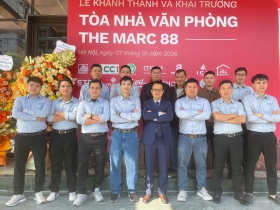


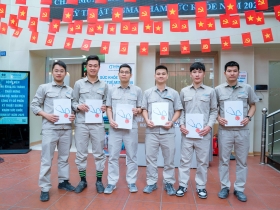



































_thumbcr_130x97.png)























 Address :
Address :  Email :
Email :  Tel : (84-24) 3 9288683 | (84-24) 3 9289235
Tel : (84-24) 3 9288683 | (84-24) 3 9289235 Fax : (84-24) 3 9288667
Fax : (84-24) 3 9288667.png)
